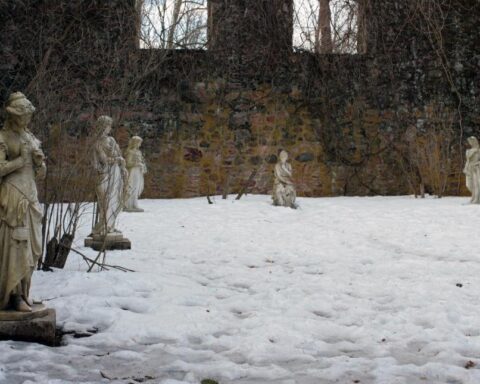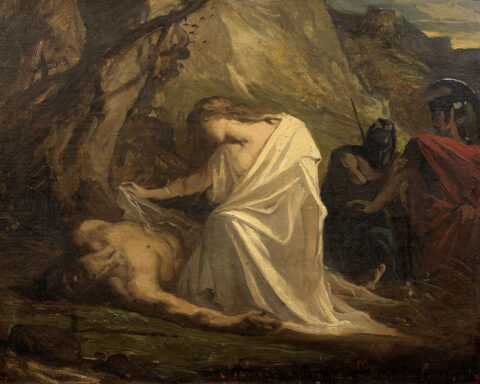David and I bought the cabin on the river in New Brunswick in a frenzy of inspiration. It was
1988, and we had returned to Newfoundland for work but wanted to spend the summers in the
Maritimes. I longed to be close to family and friends and recreate my precious childhood
cottage experience for my little boy, Ian. David’s parents had recently died, one year apart. The
world seemed bleaker without them. We wanted to hang onto the rootedness that was left
in David’s hometown. Feverish with enthusiasm about acquiring a property, the purchase
followed months of searching.
The problem was the scarcity of cottages for sale in our price range. An agent showed us
a remote cabin on clearcut hills. Another was a makeshift shack in a daisy field. One more was a
boarded up cabin jam-packed by other cottages on all sides.
The cabin in New Brunswick was plain and rustic like the northern Ontario cottages I had
grown up with. It was in forested hills outside David’s hometown of Sussex, an idyllic dairy
community with an old downtown surrounded by soft green hills. Passenger trains still chugged
past main street and outlying hay fields. It felt peaceful.
The cottage was owned by a deceased hunter, Amos Small. His elderly widow, Vera,
was selling the property. We found it down a steep bank off a dirt road, impossible to
negotiate with a vehicle. Leaving the car on the shoulder of the road and scrambling down the
bank on foot, the white clapboard cottage appeared in a meadow of tall grass and wild apple
trees. Last years dried leaves whirled in the corners of the porch. As the sales agent bent over
the front doorknob with a ring of old-fashioned keys, we could hear, just faintly, the gurgling of
the river nearby.
The door creaked open to three dark rooms, a woodstove with a crumbling firebox and a
broken toilet in the tiny washroom. I peered through the back window into woodland, just
like the cottage on Jack Lake. A musty smell emanated, and a cupboard opened to shelves
sprinkled with mouse droppings.
“It’s got potential,” I whispered to David, comparing it to the shack and the cottage
on the razed hill we’d seen. It’s been closed for months, that’s why it smells, I told myself.
Peering into the small bedrooms with windows opening to the meadow I squeezed Ian’s
small hand and whispered, “It’s so private.”
Undeterred by the dinginess, I had a vision of an idyllic family cabin that was simple
and serene. The hunting camp reminded me of an earlier time. Unlike the other cabins for sale,
it was in a secluded woodland teeming with wildlife.
Outside, we descended the steps from a porch to a path to the river. A leaf littered trail led
to a wood of birch and maple trees. We followed the path to a shallow river and stood quiet,
listening to the current, elated. Without speaking, we shared a deep sense of enchantment.
“It’s just what we were looking for,” I murmured absorbing the musical current under a
canopy of leaves.
At thirty years old, I was younger and poorer then my parents had been when they bought
their cottage on Lake Nosbonsing. Challenges seemed surmountable. I was prepared to
scrub, paint, hammer, and nail to make the cabin habitable. I was convinced that it offered an
experience that mirrored my childhood.
After buying the cottage, we returned to Newfoundland by ferry, landing in Port Au
Basques. Driving past the majestic Long Range mountains, I felt torn. Did I want to go forward
or back. I wasn’t sure.
That winter, I daydreamed about our return to the cabin in early summer. I would
plant a large garden and explore the river with Ian. I imagined building a spacious deck and
deer nibbling on leaves in the morning. The repaired woodstove would be lighted on
cool days. Like the cottage on Jack Lake, the ambiance was simple and plain. It would offer
sanctuary from the world.
That summer, though, after weeks of scrubbing, painting, and trapping mice, my glowing
vision began to wither. Weeks of heat, blackflies and broken pipes revealed a reality of the
cabin that was gloomier then my idyllic dream. The cottage had a shadow side that I was
getting to know. Scores of mice and bats had taken up residence in the roof and walls and
trapping and cleaning did not deter them. Their ruckus at night made sleep impossible.
The plumber we called about the broken toilet and pipes never showed up. We shut off the
water and hauled water in buckets from the river. One sultry afternoon, we paused from
scrubbing and painting to rest beneath the apple trees. Our neighbor, Harold, a prosperous
funeral director with a sleek RV parked by the river drove down his driveway in a gleaming
truck. His property had a shallow entrance, a smoothly mown lawn, and serene canopy that
overlooked the river. He strolled over to the cabin holding out three beers as an offering.
“Vera said the price was ten thousand. For this place!” Harold announced indignantly,
squeezing his wide hips into the fraying lawn chair. “She wanted me to buy it, three years ago. I
told her the price was too high! Amos never spent a dime on upkeep. So dark inside and that
busted toilet…”
Harold starred at my face, sunken eyed, sunburned, and spotted with blackfly bites. He
looked doubtfully at the scraggly garden that I planted. Cans of paint were stacked on the front
porch. Handing over the beers, he added, “Hate to see you working so hard in this heat.”
We drank beer while Harold regaled us with tales about the reclusive Amos Small.
“Cranky bastard! Gutted his deer here in the front yard. Didn’t worry too much about
hunting in season. This place stood empty for a few years. Couldn’t get anyone to buy it”.
My mood darkened as I scratched my blackfly bites. I was silent about the ten thousand we
had borrowed from the bank to buy the cabin.
“Didn’t see a soul here ‘til you folks came”, Harold added, glancing at the gloomy cabin
windows. “Maybe some critters.”
Harold stood up from the sagging lawn chair. “Do ya know about the swimming hole?”, he
asked brightly. “It’s down river t’wards the falls. Cold as ice. Just what the doctor ordered on a
hot day.”
That afternoon, I waded through the field down the riverbank. Squeezing through the
alders, I found a bend in the channel where the water was slow and deep. I crept onto a thick
willow branch that dipped over a deep pool. In the water were darting trout. Slipping off my
clothes, I lowered myself into the current. It was icy cold, just as Harold said. Gasping for
breath, I churned my arms and legs to warm up. The water felt delicious.
The coldness was deeply refreshing. Harold’s words echoed in my mind as I floated
peacefully. The cabin wasn’t how I imagined it to be. The enchantment I felt entering the
cabin for the first time was extinguished. It seemed like the spell had been lifted. But a swim
always had a way of cooling down my mind and infusing my spirit with buoyancy. Maybe we
could build an extension on the main room so that the cabin was brighter. Then add a deck
under the apple trees where I could sit in the mornings. Paddling into a diamond of sunshine
between the branches, I felt a glimmer of hope.
The struggle to make the cabin livable raged in the scorching days and sleepless nights.
Mouse trapping campaigns and battles with plumbing ruled our summer. The brilliant white
paint we applied made the living room look worse. All our sprucing up went nowhere.
In August, my parents visited from Ontario. Parking their station wagon on the dirt road,
they clambered down the hillside and through the meadow to the cottage, my mother wide-
eyed and father, scowling. They scrutinized the undersized porch and broken steps. Their
sleeping quarters, the musty back room, was received with dismay. Seeing the cottage through
their eyes, my remaining confidence fizzled.
My father, inspecting the interior of the shed, noticed the cracked water pump that had
been left out through the winter after the cabin was sold.
“Didn’t even bring in the pump”, he muttered crossly, blaming the former owners.“Taking advantage of young people that don’t know the difference!”
My mother, sitting in the shade of the apple tree, looked flushed. “Blackflies everywhere,”
she sighed, batting away insects.
That evening, my parents commiserated with a bottle of sherry in the gloomy back bedroom.
They shortened their visit after a sleepless night. Struggling back up the steep hillside with their
suitcases, they climbed aboard the car. Rolling up the windows as air conditioning roared, they
waved good-bye looking relieved. They sped away in a cloud of dust, glad to escape to their
comfortable retreat in Ontario on the shores of Lake Nosbonsing.
After they left, I took to sleeping alone in the back of the truck to escape the nightly
commotion. David and Ian were not bothered by the ruckus and slept soundly inside. Under the
truck cap, rain dripped but it was a relief to be outside. The air was fresh, and cooling and I
drifted off to a deep sleep listening to the hooting of owls. Wakening to a brightening morning,
I heard a shrill wail. Alarmed, I leapt out of the back of the truck. David was holding a pail with
one hand and Ian was clinging to the other.
“A bat flew into me,” Ian whimpered, tears spilling down his cheeks.
I peered into the sloshing pail of water. Inside was a drowned bat, leathery wings floating on
the water. Its head hung limply beneath the wings. Water washed gently over the small corpse.
I starred at it repulsed but saddened, marveling at the littleness of the remains. This frail
creature had haunted my sleep, fluttering inside the bedroom wall. The pail of water from the
river had been left in the kitchen because the pump was shut off. I hadn’t meant for the bat to
drown in it. I hadn’t meant to loathe the cabin either, but I did.
Starring into the pail, I made up my mind I would never again sleep in the cabin. I
would not step into the sour-smelling bathroom or musty bedrooms. It would be left to the
mice and bats and whatever creature wanted it. The cabin suited Amos Small and his solitary
hunting weekends. Cleaning and painting hadn’t altered it in the slightest. It remained dingy
and impenetrable. I pictured the abandoned cabin sinking into the meadow, the roof and
walls coming to rest beneath the apple trees. Hawks would soar over the wildflower fields.
Untroubled deer would step daintily over the rooftop to eat the fruit from the branches.
I accepted that my dream of an idyllic family cabin by the river would not happen.
I couldn’t make the cabin like the cottage of my childhood on Jack Lake with its sparkling
window, lake view and freshly painted wooden door. There, mice sometimes darted across the
floor but had not taken over. The hunting camp could not be transformed, at least by me. It
remained the domain of the deceased Amos Small, malodourous, and forbidding.
The dismal cottage adventure taught me about my limitations. Enthusiasm and good
intentions were not enough. Ultimately, the cabin vanquished me.
After the hellish summer, I refused to return. For a year, the cabin stood empty as it had in
the past; it’s only true owner, the reclusive poacher, Amos Small.
Out of the blue Harold called us in Newfoundland. “I’ll give you five thousand for it and pay
the taxes,” he offered breezily. It was a shock to be handed the chance to be free of the cottage
and humbling to sell it for half of what we had paid for it. We didn’t haggle to get a few more
hundred. Desperate, we agreed to the offer.
Later that year, David’s cousin told us that Harold pulled the cottage down, hauled the
wreckage away and expanded the acreage of his smoothly mown lawn. I imagined the patch
where the cottage once stood grew wild, and under the trees, the river flowed peacefully down
to the swimming hole. Chastened but unregretful, I was grateful to sell the cottage to Harold.
What became of my dream of a family sanctuary? It went into hibernation. It retreated,
humbled by financial and practical resources that I did not possess. The vision, though,
remained in my imagination, waiting for a chance to come alive.



